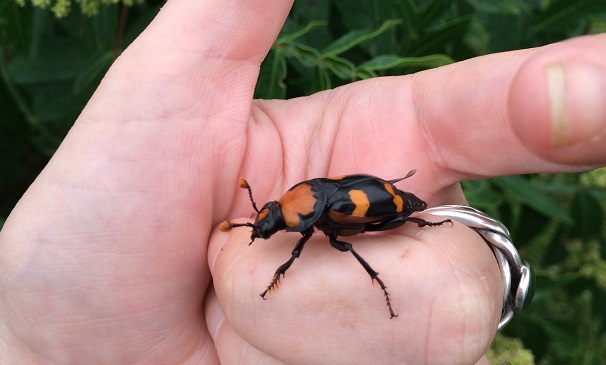ASL Files Fourth “De-list” Petition with USFWS to Remove Species that do not Warrant ESA Protection
On August 18, 2015, American Stewards of Liberty (ASL), along with a broad coalition including the Independent Petroleum Association of American (IPAA), Texas Public Policy Foundation (TPPF), and Dr. Steven W. Carothers of SWCA Environmental Consultants, filed a petition with the U.S. Fish and Wildlife Service (USFWS) to delist the American Burying Beetle (Nicrophorus americanus, or ABB) from the Endangered Species List.
The Beetle was listed as endangered in 1989, when the Service knew very little about the
bug and assumed it was at risk. That decision has cost landowners and local governments millions of dollars.
Listing decisions are often made without adequate data and this creates unnecessary burdens for many hard-working Americans, costing valuable time and money. We have a robust scientific record that concludes delisting the American Burying Beetle is clearly warranted. The bottom line is this: the known range, distribution, and abundance of the species have all been expanding in recent decades. The American Burying Beetle is not in any danger of going extinct today or in the foreseeable future.
According to the USFWS, the species is believed to occur in ten states: Arkansas, Kansas, Massachusetts, Missouri, Nebraska, Ohio, Oklahoma, Rhode Island, South Dakota and Texas.
For the state of Oklahoma, alone, the cost has been enormous. Over the last twenty years, the ABB has cost $6.5 million in protection efforts, including $1.3 million that the Oklahoma Department of Transportation spent on conservation actions during a six-year period. The ABB listing has also held up the development of the Keystone XL Pipeline. There is also the cost to small landowners and local governments. These entities are forced to face the same restrictions and delays that major industries face; however, small landowners and local governments rarely, if ever, have the same ability to absorb the demanding and costly burdens of erroneous listings.
Here is what the best available science shows today, demonstrating that the ABB should be removed from federal protection:
- The original listing relied on anecdotal records and assumed the historical range had shrunk; however, historic range contractions are not relevant to the current status of the species and reliance on anecdotal evidence to infer trends is fraught with bias and non-scientific analysis.
- The known range, distribution, and abundance of the species has been expanding in recent decades with additional survey effort, including a 100-fold expansion of the known range since listing and a 3% range expansion in 2015.
- All known naturally occurring wild populations are demographically viable for the foreseeable future, with little risk of extinction under estimated current conditions.
- No actual threats to the species have been substantiated with contemporary evidence of population declines.
- Recent trends in land use and land cover change within the range of the species are not significant and do not suggest current changes in the overall availability of actual habitat for the species.
- The species is easily raised in captivity and reintroduction efforts are underway, with recent advances in marking techniques that should improve the success of such efforts.
The Service has a statutory obligation to respond to petitioners within 90 days as to whether the petitioned action is warranted.
This is the fourth delisting petition filed by ASL (along with Dr. Steven W. Carothers of SWCA Environmental Consultants) in its ongoing campaign to remove species from the ESA list that do not warrant protection. The other petitions are for the Bone Cave harvestman, Hualapia vole, and Navasota Ladies’-tresses.


